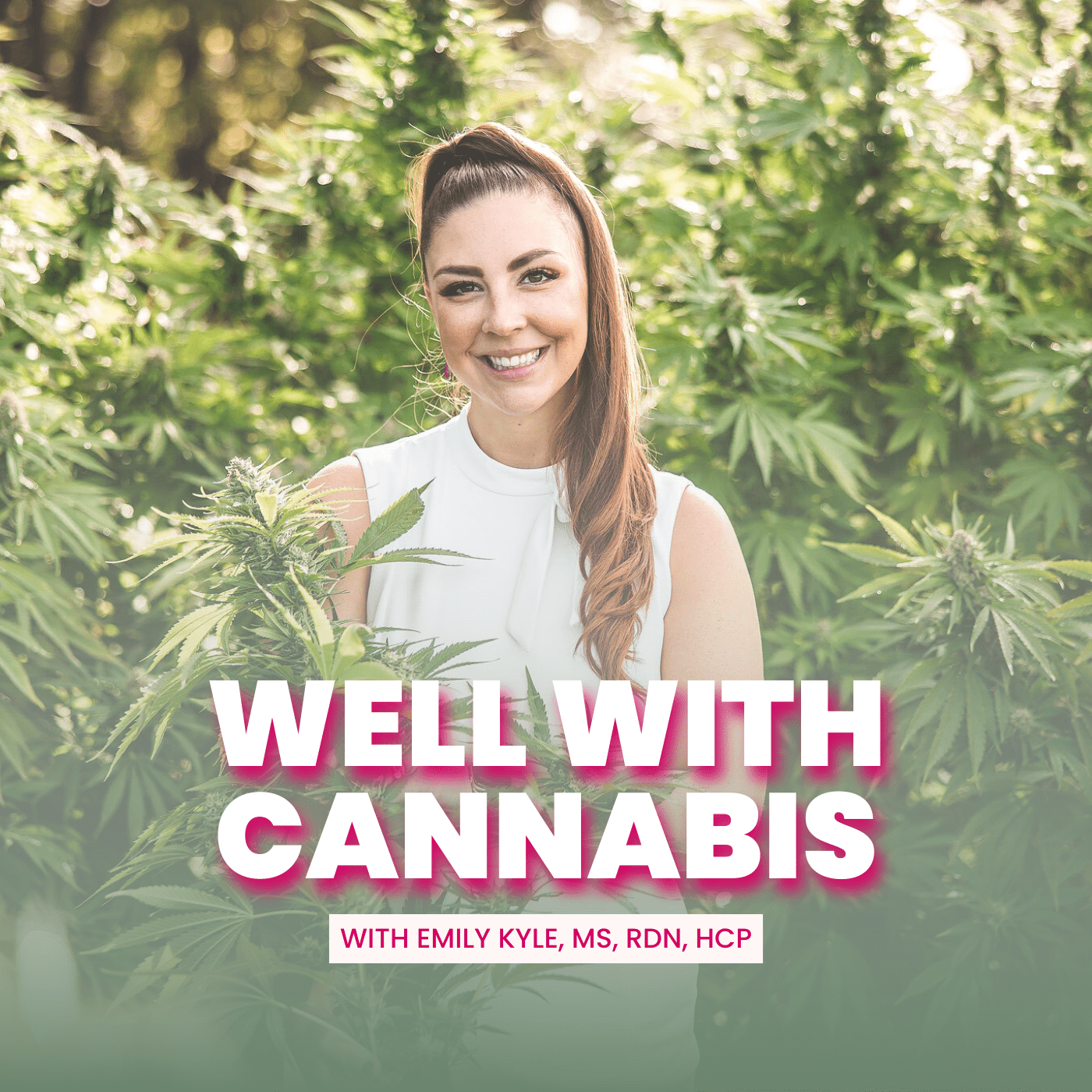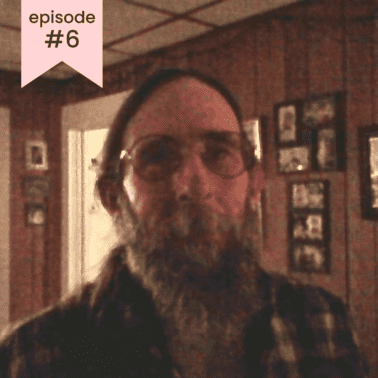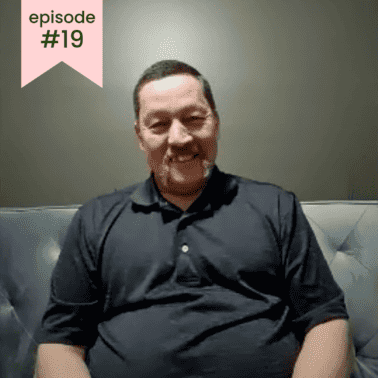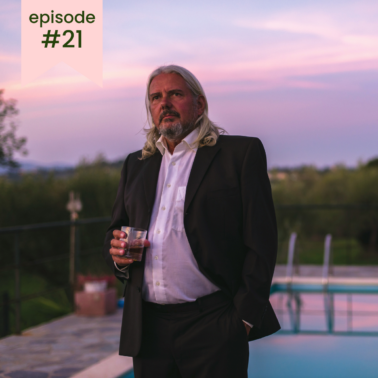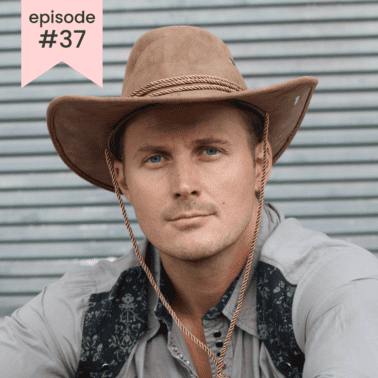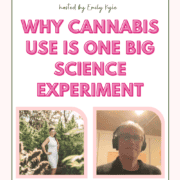In this captivating episode, we follow the journey of James Handyside, a retiree who has discovered the transformative power of cannabis. From chronic pain to sleep difficulties, James’s personal experiences have led him to explore the potential benefits of this plant. Get ready to be inspired by his story of self-discovery and learn how he has embraced personal science to improve his well-being.
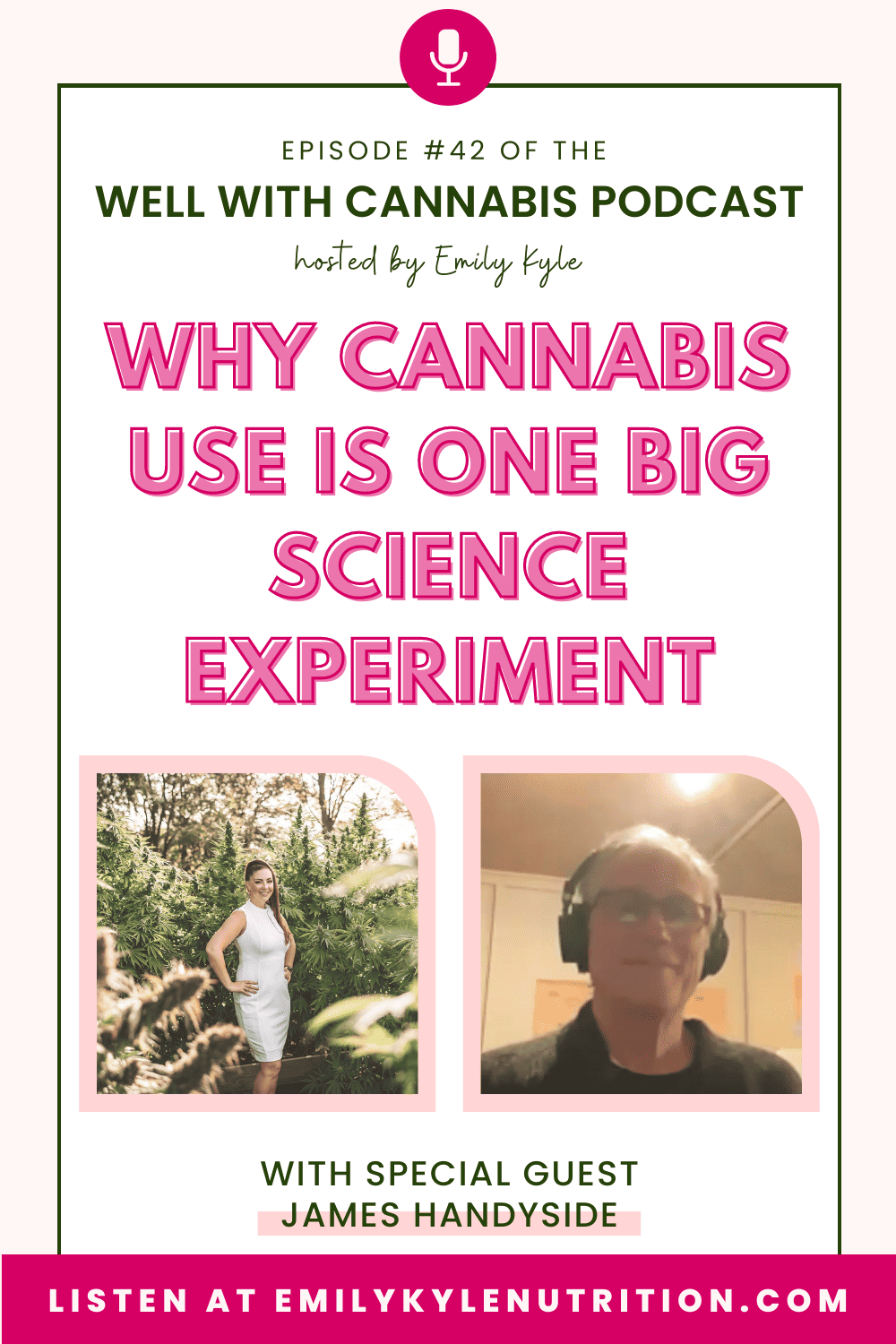
Table of Contents
Features
- Release Date: Monday, August 21, 2023
- Episode Number: Season 1, Episode 42
- Special Guest: James Handyside
Listen To The Episode
Click the play button above to listen to the episode.
Listen to all podcast episodes →
Why You Will Love This Episode
In this episode, I had the pleasure of speaking with James Handyside, a retired gentleman who has embarked on an extraordinary journey of self-discovery.
His decades-long experience as a recreational cannabis consumer led him to uncover the transformative power of medical cannabis.
His curiosity sparked when he witnessed the successful treatment of his mother’s problems associated with Parkinson’s disease through the use of cannabis oil.
James’s commitment to evidence-based practices led him to document his journey in a personal manifesto called “n of Me.”
Drawing from the understanding of medical science gained through his career; he applies a scaled-down, improvement science methodology to his health experiments.
He intends not to advocate for his universally applicable methods but to inspire listeners to approach their well-being with an evidence-guided mindset.
Discover how he has become the scientist and subject of his own experiment, shedding light on the potential of cannabis, the importance of taking a personalized approach to wellness, and how you can, too.
Related Episodes
Podcast Episodes
How Cannabis Empowered a Veteran and Single Father’s Success
Podcast Episodes
Using Cannabis in the Hospital After Surviving a Heart Attack
Podcast Episodes
Beyond Chemo: Exploring FECO in Leukemia Treatment
Full Transcript
James: Be your own personal scientist, and don’t be afraid to run your own little experiments on yourself, with yourself, and your own stuff that you’re making. And, if it works, that’s all you care about. I’m not going to publish a study.
Announcer: Welcome to the Well With Cannabis Podcast, a show dedicated to telling the life-changing stories of those who live well with cannabis all while teaching you how to do the same. Meet your host, Emily Kyle, a registered dietitian nutritionist turned certified holistic cannabis practitioner. Emily changed her life for the better with the help of the cannabis plant, and now she’s committed to helping others do the same.
Tune in each week to hear heartwarming stories and gain the knowledge you need to feel connected, inspired, and supported on your own cannabis journey. Whether you’re a new cannabis consumer or a lifetime lover, you’ll benefit from these uplifting tales of real-life journeys that will show you how you, too, can live your best life well with cannabis.
Disclaimer: Hi there. Before we jump into today’s episode, I wanted to share a note on potentially sensitive content. The episodes on the Well With Cannabis Podcast are created for adult audiences only. We will, at times, cover sensitive topics, including but not limited to suicide, abuse, mental illness, sex, drugs, alcohol, psychedelics, and the obvious use of plant medicine. Explicit language may be used occasionally. Please refrain from watching or listening to the show if you’re likely to be offended or adversely impacted by any of these topics.
The information on this show is for informational and educational purposes only. It does not constitute medical advice. If any of the content on this podcast has brought up anything for you, please reach out or speak to a professional or someone you trust.
Emily: Hello, and welcome back to another episode of the Well With Cannabis Podcast. I am excited to be here with our new friend, Mr. James Handyside! He is a retired fellow who has been loving cannabis for a long time, and we are here to talk to you all about cannabis in your life. So, welcome, James. Thank you for joining us.
James: Hey, thanks for having me, Emily.
Emily: You’re living the retired life now. Is that true?
James: Yeah. You could say that. It’s funny. I’ve worked a lot on my own independently; I had a consulting business for the last 25 years, so I didn’t have a “real” job. I didn’t punch a clock and go to park in a parking lot and go to a workplace.
James: I wound it down. But then, yeah, just in late 2019, I said, “That’s it. I’m not doing anything anymore.” After being retired for a while, I’m looking around for stuff to do that might look more like work, but I’m, fortunately, not in need of work.
Emily: It’s beautiful when you can be a little bit more selective about how you want to spend your time. You said that you’ve been using cannabis for 50 years. Is that correct?
James: Yeah.
Emily: You’ve had a lifelong journey with cannabis.
James: I started using cannabis when I was like 15 when I was young and looking for something different to do and some fun and so on. So that was 50 years ago, and back in those days, looking back on it now, the herb itself was much more primitive, and the way in which we acquired our goodies was totally under the radar because it was totally illegal and people were going to jail and stuff.
James: But yeah, so it was a recreational thing. I would get high with my buddies when we didn’t have anything to do and maybe have a couple of beers. Pot was always part of my life. I wouldn’t say it was always as big a part of my life as it is now. There wasn’t always a lot of cannabis involvement, but it was always there. And I never said, “I’m quitting this stuff.” When I wasn’t using cannabis, it was always because I couldn’t find any or I couldn’t get any, which was an issue for sure. It’s certainly not an issue anymore in Canada.
Emily: You must’ve seen so much difference in the last 50 years in the cannabis scene. How has that been, seeing that in your lifetime?
James: Yeah, it probably didn’t change much. Availability did increase in the last 15 years, but even, I would say 10 years ago, I was still going to a jazz musician’s place. Our guy was basically a musician, which doesn’t make much money, and he would sell cannabis to stay alive.
James: The big thing has been availability, and the other thing that hasn’t changed much is people’s attitude. I’ve also talked to some of my American friends about it. They saw all this legalization in Canada and figured things must be different. They really aren’t, not from my perspective, anyway, as a 65-year-old dude.
James: I have friends for whom cannabis is still part of their life, and I have friends who don’t have cannabis at all in their life. My parents are both gone now, but my mom was in the nursing home maybe about 6 or 7 years ago when I started to get into medical cannabis. Her experience was what got me into medical cannabis because she was having a lot of problems.
James: She was in the nursing home. She wasn’t ambulatory. She had Parkinson’s; she had trouble sleeping. Until then, you’d always get a bag from your buddy, like you had for the last 40 years. Things have really started to change in a favorable way in the last 10-15 years.
Emily: Absolutely. Let’s talk about your transition from the recreational to the medical world if you’re okay with talking about your mom and how your perspective on the plant changed into that medical aspect.
James: The first time I saw medical cannabis was when I was on a business trip in Los Angeles or Southern California. I ended up in an area that had a lot of businesses, but there were also medical offices. I saw a medical marijuana office where you could be assessed and also buy cannabis.
James: At that time, I thought it wasn’t medical. I figured it was some facade or something. But my mom was having trouble sleeping, and I was doing internet research for things that might be able to help her. I came upon the fact that cannabis could help with her sleep.
James: We asked her physician, who prescribed her 1:1 THC to CBD oil. I was her medical contact, so I had to go to the website, get her medical certificate, order the oil, and it would go to the nursing home where the nurses would administer it.
James: My mom was surprisingly open to it when I talked to her about trying cannabis to help her. Of course, she knew that I had used it. She found my bag and some papers once in a while, but we never really talked about it. We ended up having a conversation, and I told her that I still used cannabis and really enjoyed it. So she tried medical cannabis, which really helped her sleep, which is a big deal.
Emily: I wanted to ask, where are you located that you had such a great doctor and a nursing home that would allow her to have that?
James: Yeah, we’re in Southern Ontario. Canada.
Emily: I see. I don’t know if in the States they would allow anybody in a nursing home to take cannabis oil.
James: Yeah. I don’t know what it would be like anywhere else, but it wasn’t difficult.
Emily: Your doctor was so cool about it and prescribed it. That’s not the typical American experience, I find. I’m so glad that was your experience and that they let her use it in the nursing home.
James: Yeah. It’s always a bedtime thing. So she would get her hit at bedtime. They wouldn’t give it to her during the day. So it was really to help her sleep. It helped her sleep a lot, but in retrospect, it probably would have helped her during the day, too. She was at the end of her life, and it helped her get over the bridge.
Emily: I’m sorry for your loss. I’m so thankful that you were able to make it a comfortable experience for her in the end.
Emily: So, did you feel like your world opened up to the medical possibilities after seeing that?
James: Yeah. I ended up tearing my rotator cuff around that time. Shoulder pain is very bothersome, and it was really bugging me. So I looked into what was involved at that time to get some advice and see a physician.
James: I made an appointment at a clinic in a city near me, and I went into the clinic, and my interview with the doctor was much like what we’re doing right now. It was over the internet. The doctor was sitting somewhere, I don’t know where, and he asked me about what was going on, and I told him about my pain and so on, and I think he ended up prescribing. I think it was also a 1:1 oil, THC, and CBD.
James: At that time, you would get a medical certificate, and you could then go to providers of medical cannabis products. It was all very loose. Your certificate would allow you to get a certain amount of cannabis per month. Your certificate would run out in 4-6 months, and you’d go back to the doctor and renew it. I tried the 1:1 oil, which helped me with my sleep and shoulder pain.
James: I’d been growing my own for my “recreational” THC cannabis, so I figured I’d grow some CBD. I looked around, found some seeds, and grew my first CBD plant. I started making my own medicine about five or six years ago and continued to do so with advice from people like you. It’s not the easiest thing to figure out, and none of my friends were doing that kind of thing at that time.
Emily: So let’s talk about that. What did that transition to making your own medicine look like for you? And please emphasize the trial and error for people because a lot of people want it to be easy, but it’s really not.
James: No, it’s not easy, and I’m still learning. There’s no way that I’ve got it all figured out. I did my research on what I needed to do once I had the flowers, obviously how to get them decarboxylated and then infused and so on, so I would work on that. I don’t think I appreciated it as early on as I do now that you need to come up with your dose with the batch you’ve got because every plant is different.
James: You don’t know what the levels are because there is a big range on the seed packet. There’s a big difference between 10% and 20%. We’re used to pharmaceuticals where we take one or two pre-measured pills, and the ailment is gone. Cannabis is very different. Some of my friends noticed I was having success with medical cannabis, and I’ve given them some to try. They’ve come back saying it didn’t work. You have to play around for a while and find how cannabis works for you and in which combination it works best.
James: The other thing that I’ve been learning about is the combination of THC and CBD. It’s underrated. The doctor who issued my medical certificate told me that CBD is for inflammation and THC is for pain. Inflammation causes pain, so anything that helps with inflammation will also help with pain.
James: The fact that CBD works to relieve pain without being psychoactive is counterintuitive. People can assume that when you’re taking cannabis for pain, you’re high all the time, so you never actually know if you’re in pain. I’m sure that people with severe pain would benefit from the psychoactive aspects of THC to help them get through their pain.
Emily: It’s a beautiful thing, though. It’s a journey, a lifelong journey with cannabis. And then the more you can tailor it to exactly what you need.
James: I’m a big DIYer anyway. I live on a farm and grow most of my own vegetables. We have a big garden, and our hens are just starting to lay after the winter.
Emily: We’ve got chickens and turkeys. We started out growing a big vegetable garden and quickly realized you throw cannabis out there, and it just fits right in.
James: Oh, that’s cool. Yeah. It’s a lifestyle,
Emily: It’s enjoyable to do all those things together.
James: Yeah. It works for me. I know some people that wouldn’t be into growing, even though it’s legal in Canada to grow four plants.
Emily: Was that not legal before?
James: For whatever reason, even though it has not been difficult to find seeds here for years. In my early days of growing cannabis, I was worried that buying seeds online would reveal my address and activities and get me arrested. As it turns out, seeds fell through a legal crack, and people were somehow able to sell them.
Emily: They just had a big court ruling here in the States that determined that since seeds do not contain THC, they cannot be regulated that way.
James: That’s good. That gives the agency and ability for motivated individuals who want to make their own medicine. Pharmaceutical companies aren’t going to like it, but. Everybody else should love it. I don’t understand why anybody wouldn’t think this is right.
Emily: Especially if it makes people feel better. At the end of the day, it’s a humanitarian thing. You want people to be out of pain, you want people to feel good. And if they can do that by growing a plant in their own garden, why wouldn’t we want that for people?
James: Exactly. I think it’s gotten better. Like I say, we can grow four plants here as individuals.
Emily: Now Canada seems way more progressive than the States in my limited experience in working with people from Canada. How do you feel about the stigma and the stereotypes? Are those dissipating? Because you guys are years ahead of us, I would say, in terms of progress.
James: It’s interesting. When legalization happened, there was still a stigma surrounding the stoner stereotype, even though a lot of people would use alcohol quite freely. I lost a friend to alcohol. I regret that I gave up on them. If I had gotten more involved in his life, I could have helped him, but alcohol killed him. Cannabis isn’t going to kill anybody. You shouldn’t operate heavy machinery after getting really high, but I’d rather have someone on a two-lane road toward me who has just smoked a joint versus someone who just drank six beers. I’ll take the joint smoker any day
Emily: Same. And alcohol is never going to make your mother with Parkinson’s feel better or sleep better. It’s never going to make your shoulder feel better. It’s what we allow. It’s crazy that people still hold those strong beliefs. Cannabis is such a gift with very limited side effects.
James: Yeah, it is. It’s regrettable, but those things take a long time to go away.
Emily: Do you feel like you’re seeing progress as we move forward?
James: Yeah, I do, because people are realizing the medical benefits of it. There’s actually a joke around our area right now. Maybe it’s like this in other parts of Canada, but in Ontario, there’s a small town near us. The town’s name is Stratford, and it has maybe 15,000 people in it. There are six cannabis shops and only two liquor stores. In Ontario, liquor is sold in a store by the government.
Emily: Interesting. Are cannabis shops government shops, like alcohol stores, or not?
James: No, they’re licensed here, but they are not run by the government. There is a government website, an Ontario government website where you can buy cannabis and accessories, like grinders, and that is run by the government.
Emily: That’s something they don’t do here in the States. That’s super interesting, too.
James: I remember reading that legalizing was supposed to reduce the black market so that people would buy cannabis from a shop instead of a jazz musician. That has happened, but not as much as they would have thought. So the town with six cannabis shops has people saying that the six shops won’t all stay in business. The people going to these shops seem to be curious about the medical angle, rather than the recreational and don’t have a lifetime of experience using it. The 1:1s are popular and although some people don’t know why anyone would bother using cannabis and not getting high. It makes your pain go away, and you feel good. What’s wrong with that?
Emily: Yes. Yes. There’s such a long-held stigma that if you’re not getting high, you’re not doing it right. So many people don’t want to get high, and you can still do it right. There are so many options. You don’t have to get high, but if you want to get high, you can, and you can enjoy that too. Cannabis is for everybody in all ways, which is great.
James: Yeah, it is, and I think people are realizing that. Some friends of mine are not close friends, but we see them socially frequently, and they’re very against cannabis. I keep it under the radar when I’m with people like that because I don’t want to rock the boat. I don’t judge, and I don’t understand it. I don’t want to get into an argument because I don’t ever want to feel like I’m trying to convince people to use cannabis. There are so many things in the world that you can be judged for, but cannabis isn’t one of them.
Emily: Definitely not. No. Now, do you have a spouse or a partner? Are they supportive of your cannabis use?
James: My wife uses cannabis recreationally on occasion. We were with some friends the other night, and she usually partakes. I’d given her some of this year’s THC, she got high, and she thought she couldn’t sleep. I loaded up some CBD, and she was ready for bed in 20 minutes. CBD can be a little bit of an antidote. If you get a little over the top, CBD will take the edge off.
Emily: Absolutely, and more people need to know that because when you consume too much THC, you feel unwell, and obviously, no one wants to feel unwell, but CBD can help so much. I will share a personal story because I had always heard that and never tried it for myself. I made a cannabutter board for Thanksgiving, and it was very strong. I warned my sister that it was super strong, but I didn’t know exactly how strong because I had made it myself. Do you think anybody listened to me, including myself?
Emily: I woke up at 5:30 am the next day with the baby, and I was like, “Oh my God, I didn’t even listen to my own advice. I’m still really high.” And I took two CBD gummies, and within 30 minutes, I felt so much better. So that is just a great tip for anybody who’s nervous about using THC as well or doesn’t want to feel unwell. CBD really can come in as the hero at the end of the day to save you and make you feel better.
James: It’s really diversified the whole thing. We’ve all had experiments with edibles where we thought it wasn’t working and we should take another one. No. You should not have another one. Wait.
Emily: Absolutely. I want to be respectful of your time. I want to ask you the same four questions I ask all of my guests. Are you ready? All right, first one: What are you most proud of in your life to date?
James: When I saw that question, I was like, “Oh, come on, Emily. This is too heavy.” But there are a lot of things I’m proud of. Since my work is behind me, I won’t even touch that. I’m really proud of the farm we have. We bought 100 acres in 1987, and there were 35 acres of hardwood forest.
James: Now, there are 48 acres of woodland and naturalized space. So we took out a whole pile of marginal farmland and planted thousands of trees, and it is a park. I live in a park. I feel so fortunate to live where I do, and it’s because of our dedication to restoring some natural space. So I’m proud of that.
Emily: That’s amazing. And then you throw a cannabis plant or two in there, and you’ve got a paradise out there.
James: Exactly.
Emily: Yeah, that is awesome. Now, what do you think your life would look like without cannabis?
James: I think that for sure, one thing would have happened. I would have used more alcohol, which I don’t think is good for a lot of different reasons. I remember my dad telling me once when I was a teenager that humans have some need to change their cognition, the way they think, or how they’re feeling in their minds. This was one of the reasons that humans like alcohol. At the time, I thought that was one reason I liked pot. I’m not into other drugs, but I’m increasingly interested in psychedelics – but that’s a different matter for another day.
Emily: Absolutely. And totally not on the same playing field as any of the others.
James: But yeah I would have used more alcohol. I would have been fatter and I would have all those alcohol things. Until recently in Canada, alcohol was really the only socially sanctioned mind-altering substance, so I probably would have used more of it and that wouldn’t have been good.
Emily: That’s a great point. Such a better quality of life in the end because you have so fewer side effects with cannabis than with alcohol. It’s crazy.
James: Oh, yeah. It’s also about your body chemistry with respect to carbohydrates and fat that make you gain weight, plus the hangovers and driving impairment. I’m not saying that getting really high and driving isn’t a good idea, either.
Emily: Cannabis is just so much better on so many levels. I’ve never done anything to embarrass myself on cannabis, but I certainly have with alcohol,
James: Yeah, that’s a good one too.
Emily: With cannabis, I know it’s time to go to bed, but with alcohol, I always think I should stay up.
James: Yeah, I know. And it’s terrible for your sleep.
Emily: Yes. I love my sleep. I prefer cannabis. Sleep is precious. Next question. If you could go back 10, 20, or 30 years ago, give yourself a piece of advice; what would it be?
James: I’ve done a lot of work on myself since I retired. I’ve always tried to better myself to a degree, but before I retired, that was mostly geared toward my work. I would have told myself to work on myself just a little bit more. Cannabis helped me with that, but it wasn’t the only thing. I would have told myself to pay attention to my diet and well-being. I have had a mindfulness practice now for the last 3 years.
Emily: That’s amazing. A lot of people think cannabis does the opposite, but I love that you’re sharing that kind of helps with all of this.
James: Yeah. I use an app called Waking Up by Sam Harris. I’ve tried other mindfulness apps, but I’ve really been diving into it on this app. I’ve been a lot more self-aware since I retired.
Emily: That’s amazing. I’m so happy for you. And it’s nice that you can retire and have the time to focus on those things.
James: That part-time is one of the things that’s definitely needed.
Emily: So nice that you can do things that you actually enjoy while you’re retiring; enjoy your life. That brings us to our very last question. If you could be remembered for one thing in the cannabis space, what would it be?
James: A concept called n of Me. When you look into the scientific literature, one of the things you look for is the sample size of a study and maybe even some of the characteristics of the selection process. The term they use for the study size is “n.”
James: I think it’s important for all of us to understand this concept of n of Me. You’re the only one. You are the subject of the experiment, the one controlling it, the data collector, etc. If you’re in control of n of Me, you’re the only one who has to be convinced that it works. You don’t have to convince anyone else. You’re the one who decides whether or not this is working or not, and don’t let anybody else tell you that it isn’t working.
James: I have a lot of friends in the medical world because that’s where I worked. I wasn’t a clinician, but I worked there. One friend of mine has a lot of trouble with migraines, and she said that there is no evidence that CBD works for migraines based on her research. I’m not an advocate for anybody. You’ve got to come around to it for yourself, or you don’t.
James: To your point about what I would want to be remembered by, I would want to be remembered for encouraging people to be their own personal scientists and don’t be afraid to run their own little experiments.
James: There is more research going on now. It’s easy to run a randomized controlled trial with cannabis. But, even if it’s a placebo effect, if the placebo works, then who cares? I’m curious about the mechanism, though, and that’s one of the things that I’ve read a great deal about and continue to have an appetite for is the mechanism of action for how cannabinoids provide their efficacy in our bodies. But you don’t need to go through all that if you run a good experiment yourself: on yourself, with yourself, and your own stuff you’re making. All you really need to care about is whether it works. I’m not going to publish a study.
Emily: Everything you’re saying is so true, so spot on. I hope everybody is listening and absorbing because you are 100% right. It is an experiment. It’s unique to you. And you’re the only one who can read the data and change things moving forward.
James: That’s right. Oh, thank you. You’re the funder. You’re the funder and the researcher, and the subject.
Emily: Absolutely. And it’s okay to do those things. So many of us are afraid to trust ourselves, but you are the scientist of your own self and your own body, and you couldn’t have said it any better. Thank you so much for sharing your wisdom, sharing your experience, and giving that to our readers because I feel like that is the best message to take home. Oh, thank you so much for your time today. I really appreciate it.
James: Oh, it’s been a pleasure, Emily. Thanks.
Announcer: Congratulations, you’ve finished another episode of the Well With Cannabis Podcast and are one step closer to discovering how you, too, can live well with cannabis.
Thank you for listening in today. We hope this episode has been a helpful and informative one. Please visit emilykylenutrition.com for more information on today’s show, show notes, guest information, recipes, and other resources.
If you want more support and encouragement on your cannabis journey, please consider joining the private Well With Cannabis Community. In this group, you can connect with like-minded individuals focused on improving their health and wellness through cannabis.
Join the group today to continue your journey of wellness together!
